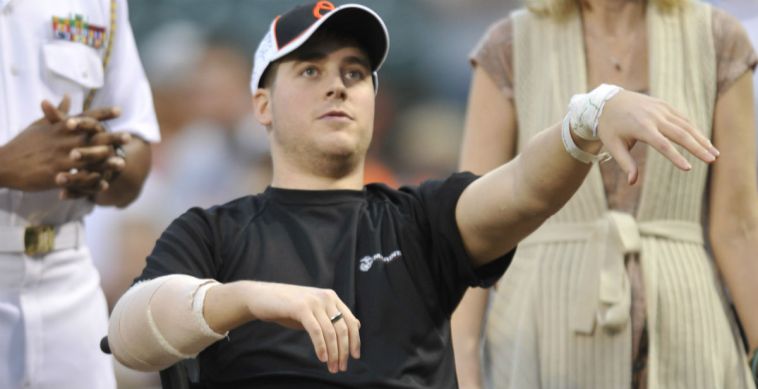DUBUQUE, Iowa (AP) – Before he deployed to Afghanistan with the U.S. Marines several years ago, Christopher Billmyer bought a German shepherd rescue dog in Los Angeles that had been hit by a car.
Videos By Rare
“I’ll take care of him,” he told the Dubuque Telegraph Herald. “I’ve always liked their looks and demeanor. They’re a one-man dog, devoted and loyal.”
Billmyer’s life took an unexpected turn on Oct. 23, 2010, when he lost both legs when he was injured by an improvised explosive device in the southern Afghanistan province of Helmand.
After his discharge, Billmyer thought about getting another dog.
“I was injured and people were talking,” he said, explaining that idea began during recuperation and rehabilitation at the Walter Reed National Military Medical Center.
He selected a German shepherd, obtained from American’s VetDogs. For nearly two years, Odin has been his close companion.
Billmyer submitted his paperwork in April 2011.
“It was like an adoption,” said Jim Billmyer, Christopher’s dad. “They take a dog, tailor it for you. I didn’t think it was that intensive.”
Neither did Christopher. He recalled meeting Odin for the first time in New York City for training.
“He absolutely hated me,” Christopher said. “He barked, whined. You’d think I was strangling him. The trainer nodded, ‘This is how it’s going to be – pretty tough.’”
Christopher and Odin trained from early in the morning to late in the afternoon. It paid off. Today, the two are inseparable. Odin accompanies Christopher to classes at Northeast Iowa Community College, in Peosta, and other places.
“He’s like my best friend,” Christopher said. “He helps me get outside and do things. I would say in my healing process, if I didn’t have him, I would be back, mentally recovering.”
Christopher suffers from mild anxiety.
“You go out in public, sometimes in crowded spaces, people are staring at you,” he said. “You lose your legs, people stare at you. He takes care of me.”
Jim and Christopher’s mother, Cheryl, agree Odin, age 4, is a perfect fit.
“I don’t think a service dog is for everyone, because if you can’t take care of them properly, or if it’s going to be hard for you to manage it, don’t,” Christopher said. “I have to take care of him, train him; no one else does. It’s a commitment, absolutely.”
He emphasizes that Odin could be taken away if he’s not cared for. That won’t happen.
“He’s a great dog; a good dog,” Christopher said. “We’ve built such a rapport, we can read each other’s body language.”
The family has another dog, Deuce, who enjoys a playful relationship with Odin. However, he doesn’t go to school.
“When Christopher graduates from college, Odin should go up on stage, too, because he’s going to have a lot of hours of teaching time,” Jim said.
Service dogs are relatively rare in Dubuque. Katrina Wilberding, founding director of Proudly Accessible Dubuque, has lived with multiple sclerosis for 25 years. Her assistance dog, Leon, a black Labrador retriever, has been with her for 10 years.
Leon is a familiar figure around town, in schools and as an educator about service dogs. Founded in 2007, one of Proudly Accessible Dubuque’s projects was to create a brochure about service dogs for business owners.
“People would come in a business and say they had a service dog,” Wilberding said. “The business owner said they didn’t act like a service dog – and they weren’t.”
Wilberding obtained Leon from the Grand Rapids, Michigan-based Paws With A Cause, a nonprofit organization that trains assistance dogs for people with disabilities.
“I can’t go any place without him,” she said. “It’s like going without glasses.”
Wilberding noted, she was “much more” independent 10 years ago. Today, Leon is the canine equivalent of an insurance policy.
Leon opens doors for Wilberding, picks up everything she drops, takes her shoes off, grabs her cellphone.
“It’s an extra reassurance to have someone around to help me,” she said. “He does so many things, I have to think of them all.”
Greg Levick, who works for the Guide Dog Foundation, the parent organization of VetDogs, has known Odin since he was a puppy. His two brothers were trained as guide dogs.
“It was good to see him again,” said Levick, one of seven Foundation field representatives, praising service dogs. “I think for most every veteran, it helps turn their lives around. A lot of them have PTSD and hesitate to go out in public. I’ve seen veterans who haven’t been in a mall in eight years and all of a sudden they’re there.
“The dogs make a tremendous impact on them. Christopher has exactly the kind of dog he wants. With having a dog comes a lot of responsibility, but the benefits far outweigh anything.”
During the past decade, Wilberding believes knowledge of service dogs has increased substantially.
“Occasionally someone will ask me if Leon’s a seeing eye dog,” she said. “They understand the concept of dogs helping people but not the details. People should always ignore a service dog of any kind and just talk to the owner.
“Before I had Leon, people would stare at my wheelchair or just ignore me, afraid they’d say something wrong. With the dog, curiosity gets the best of them, and they always want to chat.”
Wilberding does her best to educate – as does Billmyer.
“It’s OK to ask a person if they need help, or ask what the dog was trained to do,” she said. “It’s not OK to say ‘What’s your disability or why do you have a service dog?'”

